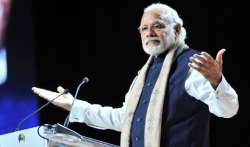After Bihar debacle, will BJP benefit by restricting PM Modi's exposure in upcoming state elections?
If political commentators are to be believed, the BJP’s decision to restrict PM Modi to a few rallies in line with his national standing and stature and allowing the local leadership to drive the campaign looks like the right strategy and is definite

New Delhi: It seems that the BJP has learnt its lessons from the massive setback it received in Bihar Assembly elections.
Political observers had pointed out that the overexposure of the Prime Minister in a state Assembly election went against the BJP as it sent out the signal that the party had no credible local face at the local level. The people of Bihar had voted overwhelmingly in favour of PM Modi in 2014 Lok Sabha elections and they wondered why Modi should once again seek votes for state Assembly elections in his own name.
Prime Minister Narendra Modi had held 31 rallies in a span of 10 days for BJP during Bihar Assembly elections. The people of Bihar, however, were not impressed by the marathon election meetings of PM Modi and the results only underlined their disapproval.
The BJP seems to have finally dissected the message of Bihar election results well and has decided to play safe in upcoming elections to 5 state Assemblies namely, Assam, West Bengal, Kerala, Tamil Nadu and Puducherry.
The first lesson the BJP appears to have learnt that a national leader of the stature of Prime Minister should not be over-exposed in state Assembly elections where he will be virtually competing with regional leaders.
Since the issues in a state Assembly election are entirely different from that of a parliamentary election, the Prime Minister’s words may not carry the conviction beyond a point because everybody knows that he won’t be a chief ministerial candidate.
Therefore, if the party fares poorly then the Prime Minister runs the risk of being ridiculed by his opponents. After Bihar fiasco, the BJP is reportedly not willing the repeat the experiment wherein the Prime Minister becomes the face of the party in state elections as well. The party, according to reports available, has decided to trust local leaders with the rein of the election campaign.
Out of the 5 states that are going to polls, the BJP fancies its chances better in Assam. Almost every pre-poll survey has predicted advantage for the BJP-led alliance over the ruling Congress. Assam will go to polls in two phases – April 4 and 11.
Prime Minister Modi, interestingly, has visited Assam only twice for election campaign. And he addressed 7 rallies during these two days. If media reports are to be believed, he is unlikely to address any more rallies in the state.
This is despite the fact that Modi is the largest crowd-puller for BJP in Assam. Other prominent party leaders including BJP President Amit Shah and Home Minister Rajnath Singh are also addressing rallies in the state but the attendance in their public meetings in not even close to what it is during PM Modi’s public rallies. It was the same case in Bihar but the BJP seems to have decided that it will not fall into the trap of bigger attendance once again and will rather focus on the basics.
Obviously, the BJP must have taken the decision of not overexposing PM Modi in these elections after due deliberations. And, it’s not limited to Assam only. Even in West Bengal, PM Modi is not likely to spend more than a couple of days from election campaign, according to some media reports, although the six-phase election schedule stretches from April 4 to May 16.
And things may not be any different in the remaining three states namely Kerala, Tamil Nadu and Puducherry especially when the party has no big hopes from these states. BJP is hoping to put up a good fight in Kerala after the party sealed an alliance with Bhartiya Dharma Jana Sena (BDJS) that has considerable influence in the electorally significant Ezhava community. But even in Kerala, PM Modi’s overexposure will not makes a big difference and therefore, the BJP is unlikely to use him in a big way.
In Tamil Nadu, the politics is completely polarised between the formations led by DMK and AIADMK. The BJP, in absence of any formidable alliance, does not have any chance in the southern state. Therefore, the party has decided against holding too many rallies of PM Modi. The union territory of Puducherry is not on the radar of BJP, anyways.
If political commentators are to be believed, the BJP’s decision to restrict PM Modi to a few rallies in line with his national standing and stature and allowing the local leadership to drive the campaign looks like the right strategy and is definitely an outcome of the bitter lessons that the party has learnt from Bihar elections. But as we say, the efficacy of every electoral strategy is put to test on the counting day only. So, let’s wait for May 19, the D-day.